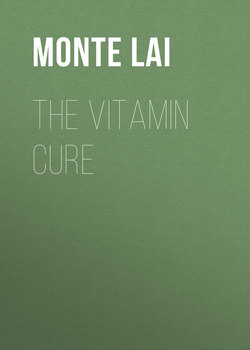Читать книгу The Vitamin Cure - Monte Lai - Страница 36
На сайте Литреса книга снята с продажи.
Оглавление15
POTASSIUM
Potassium is an essential element. On average, the human body contains about 120 g of potassium, exclusively in the form of potassium ions. Potassium ions are the most abundant cations (or positively charged ions) in the body, followed by sodium ions. Potassium ions are stored inside the cell, while sodium ions are stored outside the cell. Potassium concentration inside the cell is 30 times higher than potassium concentration outside the cell, and sodium concentration outside the cell is 10 times higher than sodium concentration inside the cell. Owing to these concentration gradients of potassium and sodium, each cell holds a tiny electric field and acts like a small battery, negatively charged inside while positively charged outside. The human body comprises 37.2 trillion cells, so we have 37.2 trillion small batteries in the body. About 40% of our daily food intake is used to recharge all these tiny batteries. A healthy body is sustained only when all of them are fully charged. The importance of potassium to human health is beyond description.
What Are the Major Functions of Potassium Ion?
• Membrane potential. All cellular membranes, particularly neurons, hold a membrane potential with negatively charged inside and positively charged outside. Membrane potential is about 70 microvolts, through which the semipermeability of the cellular membrane is established. Potassium is actively pumped into the cell, while sodium is actively pumped out of the cell. Potassium and sodium concentration gradients establish the membrane potential, and it is crucial for the existence of all living beings. If potassium and sodium concentration gradients were abolished, the membrane potential would be lost, leading to instant cell death.
• Cofactor. Potassium ions serve as cofactors for many enzymes, among which the most important enzyme is sodium-potassium ATPase. Sodium-potassium ATPase is a membrane protein that can convert ATP to ADP and release its energy for muscle contraction and the like.
• Other functions. Other cellular functions of potassium include blood pressure control and regulation, the peristaltic movement of the intestines, acid-alkaline balance, and glucose and insulin metabolism.
What Are the Symptoms of Potassium Deficiency?
• Potassium deficiency precipitates hypokalemia, characterized by weakness, fatigue, numbness in the extremities, bloating, nausea and vomiting, constipation, palpitations, and even mental disorders, such as depression, psychosis, and delusion. All these symptoms may contribute to the problem by making it harder to recharge all those tiny batteries and maintain the normal membrane potential of cells in the body.
What Are the Causes of Potassium Deficiency?
• Potassium deficiency often is caused by long-term use of diuretics, alcoholism, severe vomiting, diarrhea, and anorexia.
• Potassium deficiency is rarely caused by insufficient dietary intake.
Prevention and Treatment of Diseases
• Prevention. Meta-analysis confirms that potassium supplements can help prevent hypertension (78) and stroke (108).
• Treatment. Meta-analysis confirms that potassium supplements can help treat hypertension (78) and stroke (108).
Which Food Items Are Potassium Rich?
Many foods are rich in potassium, including acorns, pumpkins, potatoes, spinach, bananas, oranges, avocados, lima beans, cantaloupes, tomatoes, salmon, and cod. Sweet potatoes, watermelons, and legumes are also excellent sources of potassium.
This list of potassium-rich food items is adapted information provided by the USDA.
| FOOD | PORTION | POTASSIUM CONTENT, MG | % DAILY REFERENCE VALUE |
|---|---|---|---|
| Potato | 1 | 926 | 26 |
| Plum (dried) | ½ cup | 637 | 18 |
| Raisins | ½ cup | 598 | 17 |
| Plum juice | 6 ounces | 528 | 15 |
| Banana | 1 | 422 | 12 |
| Spinach (cooked) | ½ cup | 420 | 15 |
| Orange juice | 6 ounces | 372 | 12 |
| Tomato | 1 | 292 | 8 |
| Sunflower seeds | 1 ounce | 241 | 7 |
| Almonds | 1 ounce | 200 | 6 |
Daily reference value of potassium is 3.5 g according to the 2013 FDA food-labeling guidelines.
What Are the Recommended Dietary Allowances for Potassium?
| 1–3 years | 3.0 g |
| 4–8 years | 3.8 g |
| 9–13 years | 4.5 g |
| 14–18 years | 4.7 g |
| 19 years and older | 4.7 g |
There is currently no upper intake limit for potassium.
Potassium Supplements
• Type. In the marketplace, commonly found potassium supplements include potassium carbonate, potassium citrate, potassium gluconate, potassium acetate, and potassium chloride. At least 90% of potassium ingested from foods or supplements is readily absorbed in the intestines. Potassium gluconate has a less bitter taste.
• Dosage. When purchasing potassium, pay attention to product labeling. Potassium gluconate supplements may contain only 20% potassium and 80% gluconate. A 500-mg tablet of potassium gluconate may contain only 100 mg of potassium unless stated otherwise on the labeling.
• Hypertension. Potassium supplements lower blood pressure. Randomized controlled clinical studies have shown that potassium supplements taken at a dose of 1 g daily for one month lowered blood pressure from 151/93 to 138/88 in the supplement group compared to no significant change in blood pressure in the placebo group. Potassium supplements can be taken with meals to avoid nausea or vomiting.
• Hypercalcemia. Potassium supplements mitigate hypercalcemia, a high blood calcium condition that could trigger the formation of kidney stones. Potassium supplementation at a dose of 2 g daily has been found to reduce hypercalcemia by 30%.
Safety Issues
• Side effects. Taking potassium supplements at a dose of 18 g daily can give rise to hyperkalemia, a high blood potassium condition characterized by numbness in the extremities, weakness, and temporary paralysis. Other potential side effects of high-dose potassium supplements are nausea, vomiting, and diarrhea.
What Types of Drugs May Interact with Potassium?
• Hyperkalemia. Hyperkalemia can be triggered by heart disease drugs, nonsteroidal anti-inflammatory drugs, anticoagulant drugs, and antihypertensive drugs.
• Hypokalemia. Hypokalemia can be precipitated by adrenalin, bronchodilators, diuretics, and antibiotics.
